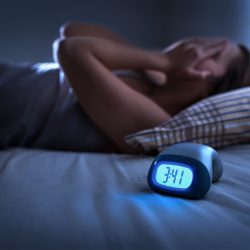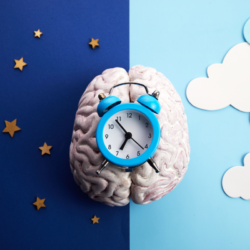Insomnia is a major health concern that can have devastating effects on quality of life and general well-being. In the quest for restful sleep natural methods are gaining in popularity, and ASMR (Autonomous Sensory Meridian Response) is emerging as an intriguing approach backed by scientific evidence. In this article, we will explore in depth how ASMR can be used as an effective tool to combating insomnia based on scientific research and evidence.
How does ASMR work?
ASMR works by stimulating the senses in a soothing way. Videos, for example, create an immersive environment using soft sounds, gentle movements and relaxing visuals. These stimuli trigger the release of endorphins and serotonin, neurotransmitters linked to well-being and relaxation. By incorporating ASMR into your pre-bedtime routine, you can create a relaxing ritual that naturally prepares your mind and body for sleep.
The benefits of ASMR for sleep
ASMR is unique in its ability to offer a range of tangible benefits for managing insomnia and improving sleep quality. Physiological mechanisms underpin these benefits and contribute to creating an environment conducive to falling asleep and deep relaxation.
- Stress reduction: ASMR sessions are associated with a reduction in levels of cortisol, the stress hormone. This reduction in cortisol promotes a calm and relaxed mental state, creating a solid foundation for peaceful sleep.
- Anxiety relief: ASMR serves as a relaxation method that can calm anxious thoughts and reduce mental agitation. By reducing these psychological obstacles, ASMR paves the way for faster sleep and fewer night-time awakenings.
- Improved concentration: Quality sleep obtained with ASMR has positive implications for mental clarity and concentration during the day. A rested mind manages daily tasks more easily and effectively.
- Stimulation of the parasympathetic system: ASMR triggers activation of the parasympathetic nervous system, which is responsible for relaxation and sleep regulation. By encouraging parasympathetic activity, ASMR helps to create a state of readiness for sleep.
- Soothing Bedtime Ritual: Incorporating ASMR into your bedtime routine can establish a soothing ritual. When your mind associates these sensory stimuli with relaxation and sleep, it creates a positive anticipation of sleep, helping a smooth transition to rest.
ASMR to combat insomnia
ASMR, known to induce tingling sensations and relaxation in some people, is attracting increasing interest in the context of insomnia management. Recent research suggests that this sensory response may play a significant role in regulating the nervous system and mental state, thereby contributing to a better quality of sleep.
The physiological response
The impact of ASMR on the body’s physiological response has attracted growing interest within the scientific community. Numerous studies have focused specifically on the neurotransmitters essential for relaxation and sleep to unravel the underlying mechanisms.
ASMR stimulation has been identified as a potential trigger for the release of endorphins and serotonin. These two neurotransmitters play a crucial role in regulating mood and mental state. These biochemical substances have the ability to reduce stress and anxiety. In this way, they help to create an environment conducive to falling asleep and an overall improvement in sleep quality.
Several studies have highlighted the association between the increased release of endorphins and serotonin due to ASMR. As well as the calming effect of these neurotransmitters on the central nervous system. Experiments including measurements of heart rate, blood pressure and brain activity confirmed that ASMR sessions induced physiological responses conducive to relaxation and sleep.
These findings suggest that ASMR can positively influence the chemical balance of the brain. This is achieved by promoting the release of neurotransmitters associated with relaxation. As a result, falling asleep may be made easier and sleep quality improved, making ASMR a promising strategy in the fight against insomnia.
Effects of ASMR on the nervous system
One of the key dimensions of the efficacy of ASMR in the management of insomnia lies in its impact on the nervous system in particular the activation of the parasympathetic system. This component regulates the body’s automatic functions. Including those that contribute to relaxation and preparation for sleep.
In-depth studies have examined the effects of ASMR on physiological measures. Such as heart rate and blood pressure. The results of these studies have shown significant and consistent changes in these parameters. A reduction in heart rate and blood pressure. Suggesting a reduction in sympathetic nervous system activity, which is associated with stress and agitation.
How to incorporate ASMR into your bedtime routine
Practising ASMR (Autonomous Sensory Meridian Response) before bed can transform your bedtime experience into a moment of relaxation and serenity. Here are some ways to incorporate ASMR into your night-time routine:
- Discovering ASMR Videos: Browse online platforms to discover a rich selection of videos. Whether you’re drawn to the delicate sounds of nature, soothing whispers, or massage simulations, there’s a variety of content to suit your personal preferences. For the best experience, create a playlist of your favourite videos to help you make a smooth transition to sleep.
- ASMR Podcasts for Auditory Escape: Podcasts offer a unique audio immersion, ideal for relaxing before going to sleep. Choose from a variety of themes, from gentle narration to soothing ambient noise, for a tailor-made listening experience. Use comfortable headphones for total immersion.
- Auto-ASMR techniques: Auto-ASMR is a simple and effective method of inducing relaxation. Use gentle gestures such as lightly tapping your arms or brushing your skin with soft objects such as feathers or soft brushes. These actions stimulate the ASMR response and promote a state of well-being conducive to sleep.
- Guided visualisation for peace of mind: Complement your experience with guided visualisation sessions. Use applications or audio recordings to guide you in creating a soothing mental landscape. Combine this with deep breathing techniques to enhance the relaxing effect and prepare your mind for night-time rest.
By incorporating these practices into your bedtime routine, you create an environment conducive to restful, quality sleep. Experiment and find the combination that suits you best for peaceful, rejuvenating nights.
Sources
- https://pubmed.ncbi.nlm.nih.gov/34915083/
- https://www.ncbi.nlm.nih.gov/pmc/articles/PMC9915972/
- https://pubmed.ncbi.nlm.nih.gov/29924796/







